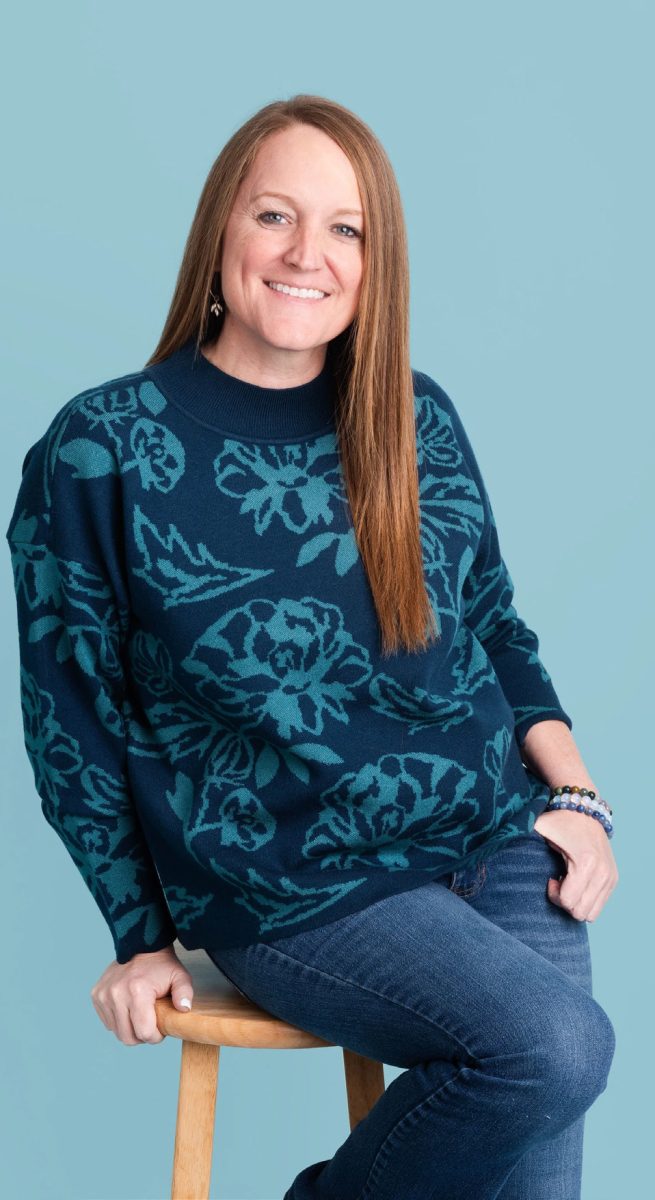Hamilton College’s Pre-Law Club welcomed Shane Cooper, Senior Associate Dean for Admissions, Financial Aid and Student Services, to share insights on the law school admissions process, student experience and employement outcomes. The event took place on Tuesday, Sept. 30 in the Kirner-Johnson Building’s Red Pit, and welcomed a significant crowd of students across class years. Pre-Law Club leaders, Archer Fried-Socarides ’27 and Lila Cahill ’27, led the conversation, prepared with questions from club members and their own inquiries.
Cooper began by sharing a brief introduction to his own career, starting at Holy Cross College through a Reserve Officers Training Corps (ROTC) scholarship, before becoming a submarine officer and eventually attending law school at Cornell. Once graduating with his Juris Doctor (J.D.), he became a Judge Advocate and a lead for the Navy’s legal education and training program. Cooper also received an Legum Magister (L.L.M.) from Columbia University in 2012. For the past year, Cooper has worked at Cornell Law School, located in Ithaca, NY, where he is responsible for various tasks including supporting the recruitment of new applicants, connecting with members of the student body and working closely with the faculty Administrative Committee.
Cooper then provided guests with an overview of Cornell Law School, welcoming roughly 215 new students per cycle, amounting to a total of about 600 students. Each year, Cornell Law also welcomes about 100 attorneys to pursue their LLM degrees, a postgraduate program that allows for the specialization into a certain law subarea.
Not dissimilar to Hamilton, Cooper noted, Cornell Law School prides itself on creating small and tight-knit cohorts where students are encouraged to get to know one another, and take advantage of the resources available to them. Due to the unique community at the school and the sense of assuredness that students will be able to find employment post-grad, Cooper describes the atmosphere as not one of competition or cut-throat relationships, but of collaboration and discipline.
Cooper then outlined with students the elements of each year of law school, with a particular focus on the first or 1L year, which offers a pre-set curriculum, including classes like Contracts, Conn Law, Civil Procedure and Lawyering. Ultimately, while as a practicing lawyer one isn’t contacting into each of these fields, the courses are designed to collectively support students in their ability to apply critical thinking and analytical skills, necessary to become a strong attorney.
Students are also invited to take part in a half-credit pass or fail course which promotes professional development skills, such as resume and cover letter building, job exploration, wellness resources and effective communication and dialogue skills. “That kind of thing is not covered in your torts class,” Cooper said.
Of students enrolled at Cornell Law School, 15 percent are first-generation college students, and about one-third are first-year law students. Students come from over 30 states and 8 countries, with most not coming from the Central New York region where Cornell Law School is located. Notably, only six percent of applicants come from STEM major backgrounds, offering an important advantage and ability to stand out for those students.
Cornell Law School offers various unique opportunities for students to gain pre-professional experience outside of the classroom. With over 27 clinics and practical experience opportunities, students can gain knowledge in a wide range of areas, while continuing to strengthen their academic skills. Cooper shared that 85 percent of students participate in these programs, with others opting to take part in externships monitored by the school to ensure optimal learning outcomes. Cornell Law School also maintains partnerships with over 20 international law schools, with over 20 percent of the school’s student body choosing to study abroad. However, Cooper encourages students to do so in their third or 3L year, and ideally once a job has been secured.
Of student outcomes, various opportunities are available that are split into three main categories: Big Law, federal clerkships and public interest or government work. Big Law is the most lucrative, and often useful for paying off student loans, while also providing students with important skill-building opportunities through “excellent training.” Federal clerkships provide students with an unmatched opportunity to understand the law, with some programs—particularly in the North—asking students to participate in a year of Big Law before pursuing the program. Finally, public interest and government law was highlighted, which include opportunities working with the Department of Justice, Public Defender’s offices and State Attorney General’s Office, similarly providing law graduates with an incredible array of law and government experience.
Cooper shared various insightful tips on how to put your best foot forward in the law school application process. The biggest effort, he noted, should be placed on the Law School Admission Test (LSAT), which once taken, lasts for five years. However, he warned, due to score inflation, what may seem like a “high” score, may not be as “competitive” in an application pool several years down the line.
Similarly, Cooper explored what admissions deans look for while examining student applications. Ultimately, the office wants to ensure that students can display maturity and preparedness to take on the intense work of law school, while also illustrating a clear purpose for choosing law, even if they are unsure about a particular field of law. He explained that for students beginning law school in August of any given year, they will already be participating in screening interviews as early as November of that same year, highlighting the necessity to be engaged in the process and ready to fully commit to diving in.
Of undergraduate priorities, he encourages students to find ways to display academic rigor and critical thinking skills, useful priorities for both law school and law careers. In particular, he highlights the value of American government courses, political law classes and constitutional law courses and any that ask students to write often and effectively. However, much like his advice on picking extracurriculars, he advises students not to choose courses based on what they think will impress an admission counselor.
“I was really happy with how the event went, it was great to hear Cooper encourage students to take classes and join clubs that they are passionate about in undergrad,” Cahill said.
Finally, Cooper shared one other notable line of advice. If you are interested in trying out another job sector or exploring a passion, do so before applying to law school, because once students are engaged on the track, it is a rather clear path from there. For those interested in learning more about Cornell Law School, Cooper encouraged students to reach out to his office, as well as attending their upcoming Open House on Tuesday Oct 7th. Students can register online on their website.


























